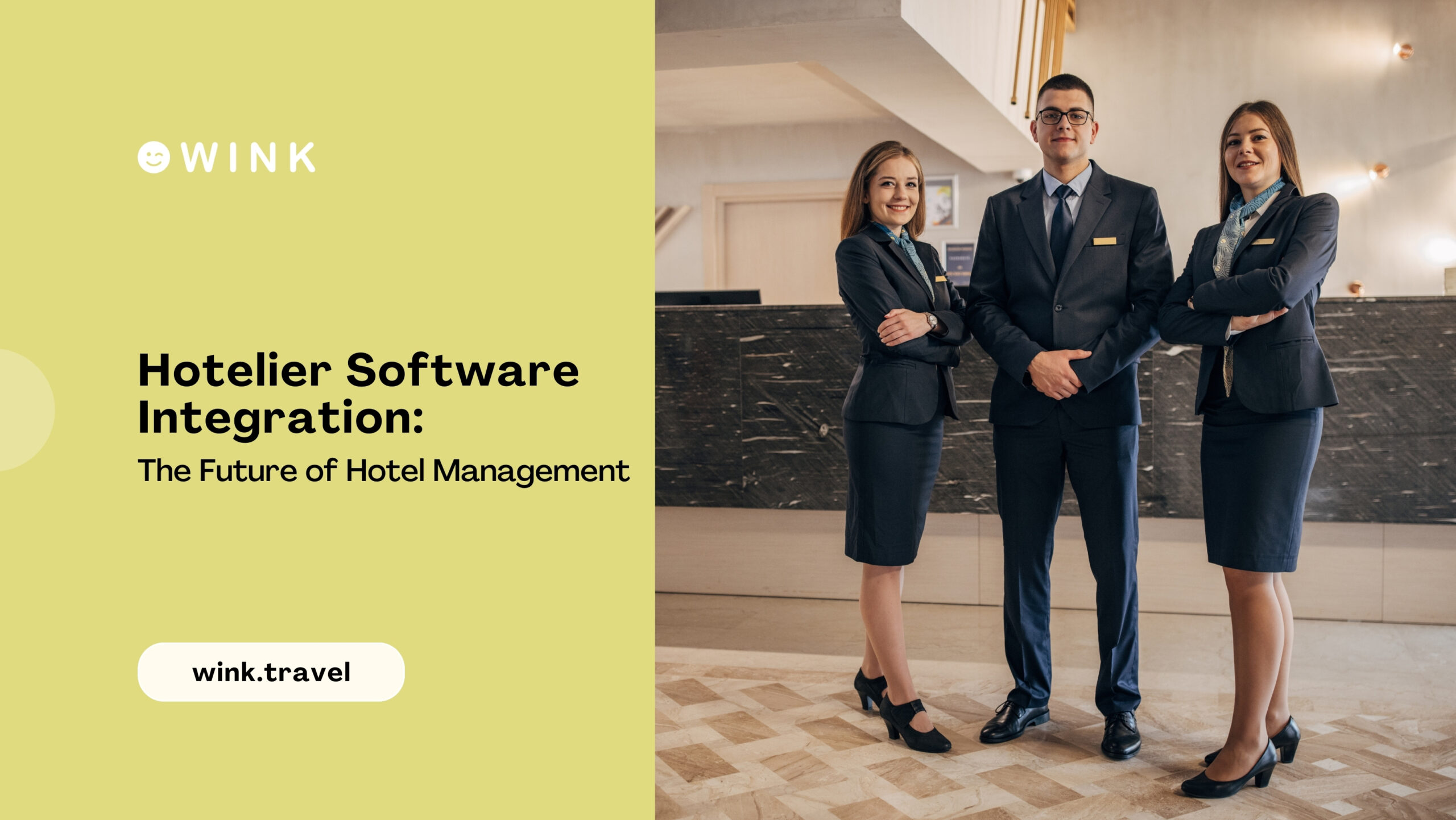The hospitality industry is constantly evolving and filled with opportunities. Hotels work tirelessly to improve operations, create memorable guest experiences, and boost revenue. In our tech-driven world, having an effective hotel management system is essential for success. These systems simplify tasks, automate processes, and provide valuable insights into key performance area indicators.
However, many hotels rely on disparate systems that operate in silos, hindering efficiency and creating data inconsistencies. Hotel software integration solves this challenge by enabling seamless system communication and data sharing.
This blog will explore the transformative power of hotel software integration and how it can enhance efficiency, improve guest satisfaction, and drive revenue growth. We’ll delve into the key benefits, essential systems to integrate, challenges to overcome, and best practices for successful implementation.
Table of Contents
Understanding Hotel Software Integration
Hotel software integration is the key to unlocking a new level of efficiency and guest satisfaction in the hospitality industry. It refers to connecting different software systems used in a hotel, enabling seamless data sharing and communication. This means that instead of operating in silos, various systems, such as the property management system (PMS), reservation system, and revenue management system, can exchange information and work together seamlessly.
This integration offers significant benefits for hotels, including improved efficiency by automating tasks, eliminating manual data entry, streamlining operations, and freeing up staff time. It also enhances the guest experience by providing access to real-time data and centralized guest profiles, enabling personalized service and faster response times.
Integration also reduces errors by automating data transfer between systems, minimizing the risk of manual errors, and ensuring data consistency. Furthermore, it optimizes revenue by enabling dynamic pricing and better inventory management by connecting different systems, such as the PMS and revenue management systems.
Finally, hotel software integration facilitates better decision-making by providing access to comprehensive data and analytics, offering valuable insights into hotel performance. By connecting various systems and enabling seamless data flow, hotel software integration streamlines operations improves efficiency, and enhances the guest experience, leading to better decision-making, optimized revenue, and ultimately, a more tremendous success for the hotel.
Essential Systems to Integrate
A truly integrated hotel tech stack can significantly enhance efficiency and guest satisfaction. Here are some of the key systems that can be connected:
- Property Management System (PMS): The central hub of hotel operations, managing reservations, guest profiles, room assignments, billing, and more. Integrating the PMS with other systems ensures that data is consistent and accessible across all platforms.
- Reservation System: This system handles bookings from various channels, including the hotel website, online travel agents (OTAs), and phone reservations. Integrating it with the PMS streamlines the booking process, prevents overbookings, and ensures accurate inventory management.
- Channel Manager: This tool helps manage room rates and availability across multiple online distribution channels. Integrating it with the PMS and reservation system ensures rate parity and real-time inventory updates across all platforms.
- Point-of-Sale (POS) System: This system manages transactions at various points of sale within the hotel, such as restaurants, bars, and spas. Integrating it with the PMS allows for seamless billing and revenue tracking.
- Guest Relationship Management (CRM) System: This system helps hotels build and manage guest relationships by storing preferences, tracking interactions, and personalizing communication. Integrating it with the PMS and other systems enables a 360-degree view of the guest, facilitating personalized service and targeted marketing.
By integrating these systems, hotels can create a seamless flow of information, automate tasks, and enhance the guest experience.
For example, a guest booking through an OTA can be automatically checked in through the PMS, and their preferences can be shared with the housekeeping and front desk staff through the CRM, ensuring a personalized and efficient stay.
The Benefits of Integration
Hotel software integration offers many benefits that can significantly impact a hotel’s efficiency, profitability, and guest satisfaction. Some of the key benefits include:
- Improved Data Accuracy: Integration eliminates manual data entry and reduces the risk of errors by automating data transfer between systems. This ensures that information is consistent and accurate across all platforms, leading to better decision-making and reporting.
- Reduced Manual Tasks: Integration automates various tasks, such as guest check-in/check-out, payment processing, and inventory updates. This frees up staff time, allowing them to focus on more strategic tasks and guest interaction, ultimately improving productivity and efficiency.
- Enhanced Guest Experience: Integration enables a more personalized and seamless guest experience. With access to centralized guest profiles and real-time data, staff can anticipate guest needs, provide tailored services, and respond to requests promptly, increasing guest satisfaction and loyalty.
- Streamlined Operations: Integration streamlines various operational processes, such as reservations, housekeeping, and maintenance. This improves efficiency, reduces costs, and minimizes delays, leading to smoother operations and a better guest experience.
- Optimized Revenue: Integration between the PMS, revenue management system, and channel manager enables dynamic pricing and better inventory control. This allows hotels to maximize occupancy and revenue by adjusting rates based on demand and availability across all distribution channels.
For example, integration can automate updating room availability across all booking channels when a reservation is made through the hotel website.
It can also enable personalized welcome messages to be sent to guests upon check-in based on their preferences stored in the CRM. By streamlining operations and enhancing the guest experience, integration helps hotels achieve their business objectives and drive success.
Challenges and Considerations
While hotel software integration offers many benefits, it’s crucial to approach the process with a clear understanding of the potential challenges. One common hurdle is ensuring data compatibility between different systems, mainly if they use varying formats or protocols. Integrating multiple systems can also be complex, demanding careful planning and technical expertise.
Furthermore, integration involves costs for software, implementation, and ongoing maintenance, which must be factored into the budget. Choosing the proper integration solutions and vendors is another critical consideration, as is the need for comprehensive staff training to ensure employees can effectively utilize the new integrated systems.
To navigate these challenges successfully, hotels should prioritize selecting systems designed for integration or those with open APIs. Seeking expert advice from technology consultants or integration specialists can also be invaluable in ensuring a smooth process.
Developing a detailed integration plan that outlines the scope, timeline, and required resources is essential for staying on track and minimizing disruptions. Data security should be paramount throughout the process, with robust measures to protect sensitive information. Finally, investing in staff training is crucial for empowering employees to utilize the integrated systems effectively.
When evaluating potential integration solutions, consider factors like ease of use, functionality, scalability, and vendor support. By carefully considering these challenges and making informed decisions about integration solutions, hotels can successfully integrate their systems and reap the many benefits of a connected technology ecosystem.
Integration Best Practices
Successful hotel software integration requires careful planning, execution, and ongoing maintenance. Here are some best practices to ensure a smooth and effective integration process:
- Planning and Preparation: Before starting the integration process, it’s crucial to develop a comprehensive plan that outlines the scope, timeline, resources, and objectives. This plan should involve key stakeholders and clearly define roles and responsibilities.
- Data Mapping: Data mapping identifies and matches data fields between different systems. This ensures that data is transferred accurately and consistently between systems. Careful data mapping is crucial for avoiding errors and ensuring data integrity.
- Testing: Thorough testing is essential to ensure the integrated systems work as expected. This includes testing data transfer, functionality, and performance. Testing should be conducted in a controlled environment before the integrated system’s launch.
- Communication: Throughout the integration process, maintain open communication with all stakeholders. This includes providing regular updates, addressing concerns, and ensuring everyone is informed about the progress.
- Training: Provide adequate training to staff on the new integrated systems. This will ensure that employees can effectively use the systems and maximize their benefits.
- Ongoing Maintenance and Updates: Integration is not a one-time event. Ongoing maintenance and updates are essential to ensure the integrated systems continue functioning smoothly and remain compatible with evolving technologies.
By following these best practices, hotels can minimize disruptions, avoid costly errors, and ensure a successful integration process. This will enable them to fully reap the benefits of integrated systems, enhance their operational efficiency, and improve guest satisfaction.
Expert Insights: Interviews with Industry Leaders
To gain deeper insights into the world of hotel software integration, we sought the perspectives and experiences of industry leaders.
Yann Guichoux, Global SVP of Product at Cloudbeds: “Integration is no longer a luxury but a necessity for hotels to thrive in today’s competitive landscape. It’s about breaking down data silos and creating a seamless flow of information across all systems. This empowers hotels to personalize the guest experience, optimize operations, and make data-driven decisions.” Yann emphasizes the importance of choosing the right technology partners and investing in scalable and adaptable solutions to future needs.
Bjorn Hanson, Clinical Professor at the NYU Jonathan M. Tisch Center of Hospitality:
“Integration is key to unlocking the full potential of hotel technology. By connecting different systems, hotels can gain a holistic view of their operations and guest behavior, enabling them to personalize services, optimize pricing, and improve overall efficiency.” 2 Bjorn predicts that AI and machine learning will play an increasingly important role in hotel software integration, enabling more intelligent automation and predictive analytics
The Future of Hotel Software Integration
The future of hotel software integration is brimming with potential, driven by emerging technologies that promise to reshape the hospitality landscape. Artificial intelligence (AI) and machine learning will be pivotal in automating tasks, personalizing guest experiences, and providing predictive analytics.
At the same time, the Internet of Things (IoT) will connect devices and systems seamlessly, creating a truly smart hotel environment. These advancements will lead to more efficient operations, hyper-personalized guest experiences, and data-driven decision-making.
To prepare for these changes, hotels should invest in future-proof solutions with open APIs and flexible integration capabilities, ensuring they can adapt to evolving technologies. Prioritizing data security through robust measures is also crucial to protecting sensitive guest information and complying with regulations.
Moreover, hotels need to upskill their staff, providing training on new technologies and digital skills to maximize the benefits of integrated systems. By embracing innovation and staying ahead of the curve, hotels can harness the power of integration to create a more efficient, guest-centric, and sustainable future.
Conclusion
Hotel software integration is no longer a luxury but necessary for hotels seeking to thrive in the competitive hospitality landscape. By connecting disparate systems and enabling seamless data flow, hotels can unlock new levels of efficiency, enhance the guest experience, and optimize revenue.
Investing in the proper integration solutions is crucial for success in the modern hotel industry. We encourage you to explore the diverse options available and find the perfect fit for your hotel’s unique needs. Embrace the power of integration and unlock your hotel’s full potential.









